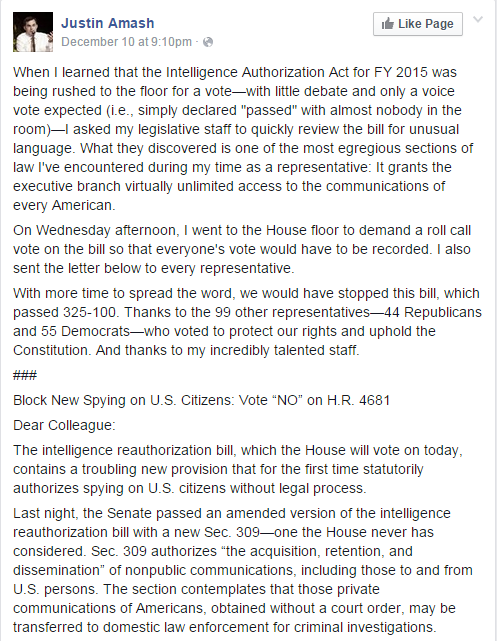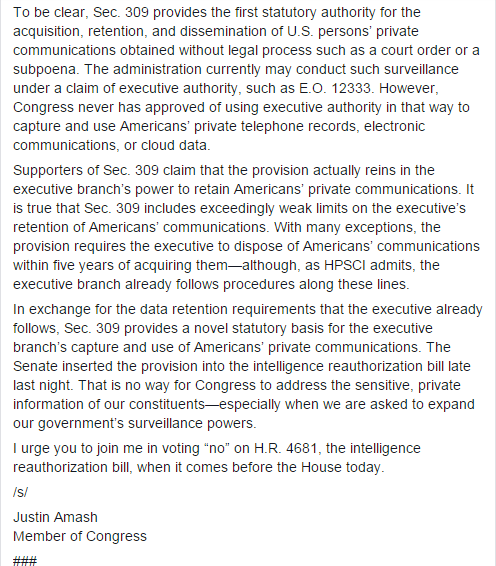Andrew Anglin
Daily Stormer
December 13, 2014

Since December 10th when H.R. 4681 was passed by the House, the media has remained entirely silent on section 309 of the bill, which allows for law enforcement to illegally collect and store electronic data without a warrant and use it against us with impunity.
It also appears to allow law enforcement unlimited access to data the NSA has already collected through that program Edward Snowden exposed.

The legislation was scheduled for only a “voice vote,” which means that it is simply declared “passed” with voice votes and no record.
This is considered the simplest and quickest voting method, not what one would expect from such an important piece of legislation. For most pieces of major legislation, a roll call vote would be the standard operating procedure.
Thankfully, Representative Justin Amash, when catching wind of what was transpiring, went to the House floor to demand a roll call vote so that everyone would have to have their vote recorded.
The fact that this important piece of legislation was handled in this way indicates that this was done intentionally to sneak it past the public eye. It becomes even more suspicious when you realize that it was done concurrently with the CIA torture report being released and the Gruber hearing.
…
This bill will allow information gained from domestic spying by the feds, in the name of “terrorism,” to be transferred to local law enforcement for criminal investigations without any type of court order, subpoena or warrant.
This is one of the most drastic changes in U.S. law in our lifetimes and has the potential to turn the U.S. into a true police state.
Here are the comments Amash made on the bill from his Facebook page:
I am obviously a newsman, and I have never seen the media this intensely silent about any single issue. Honestly. It is madness.
Unsurprisingly, the section allowing this was added by the Jewess Dianne Feinstein.
This is a massive, massive thing. People need to spread this information immediately.
A petition has been organized.
Here is the full text of the section in question. The entire bill can be read on the Congress’ website, here.
SEC. 309. PROCEDURES FOR THE RETENTION OF INCIDENTALLY ACQUIRED
COMMUNICATIONS.
(a) Definitions.--In this section:
(1) Covered communication.--The term ``covered communication''
means any nonpublic telephone or electronic communication acquired
without the consent of a person who is a party to the
communication, including communications in electronic storage.
(2) Head of an element of the intelligence community.--The term
``head of an element of the intelligence community'' means, as
appropriate--
(A) the head of an element of the intelligence community;
or
(B) the head of the department or agency containing such
element.
(3) United states person.--The term ``United States person''
has the meaning given that term in section 101 of the Foreign
Intelligence Surveillance Act of 1978 (50 U.S.C. 1801).
(b) Procedures for Covered Communications.--
(1) Requirement to adopt.--Not later than 2 years after the
date of the enactment of this Act each head of an element of the
intelligence community shall adopt procedures approved by the
Attorney General for such element that ensure compliance with the
requirements of paragraph (3).
(2) Coordination and approval.--The procedures required by
paragraph (1) shall be--
(A) prepared in coordination with the Director of National
Intelligence; and
(B) approved by the Attorney General prior to issuance.
(3) Procedures.--
(A) Application.--The procedures required by paragraph (1)
shall apply to any intelligence collection activity not
otherwise authorized by court order (including an order or
certification issued by a court established under subsection
(a) or (b) of section 103 of the Foreign Intelligence
Surveillance Act of 1978 (50 U.S.C. 1803)), subpoena, or
similar legal process that is reasonably anticipated to result
in the acquisition of a covered communication to or from a
United States person and shall permit the acquisition,
retention, and dissemination of covered communications subject
to the limitation in subparagraph (B).
(B) Limitation on retention.--A covered communication shall
not be retained in excess of 5 years, unless--
(i) the communication has been affirmatively
determined, in whole or in part, to constitute foreign
intelligence or counterintelligence or is necessary to
understand or assess foreign intelligence or
counterintelligence;
(ii) the communication is reasonably believed to
constitute evidence of a crime and is retained by a law
enforcement agency;
(iii) the communication is enciphered or reasonably
believed to have a secret meaning;
(iv) all parties to the communication are reasonably
believed to be non-United States persons;
(v) retention is necessary to protect against an
imminent threat to human life, in which case both the
nature of the threat and the information to be retained
shall be reported to the congressional intelligence
committees not later than 30 days after the date such
retention is extended under this clause;
(vi) retention is necessary for technical assurance or
compliance purposes, including a court order or discovery
obligation, in which case access to information retained
for technical assurance or compliance purposes shall be
reported to the congressional intelligence committees on an
annual basis; or
(vii) retention for a period in excess of 5 years is
approved by the head of the element of the intelligence
community responsible for such retention, based on a
determination that retention is necessary to protect the
national security of the United States, in which case the
head of such element shall provide to the congressional
intelligence committees a written certification
describing--
(I) the reasons extended retention is necessary to
protect the national security of the United States;
(II) the duration for which the head of the element
is authorizing retention;
(III) the particular information to be retained;
and
(IV) the measures the element of the intelligence
community is taking to protect the privacy interests of
United States persons or persons located inside the
United States.
 Daily Stormer The Most Censored Publication in History
Daily Stormer The Most Censored Publication in History




